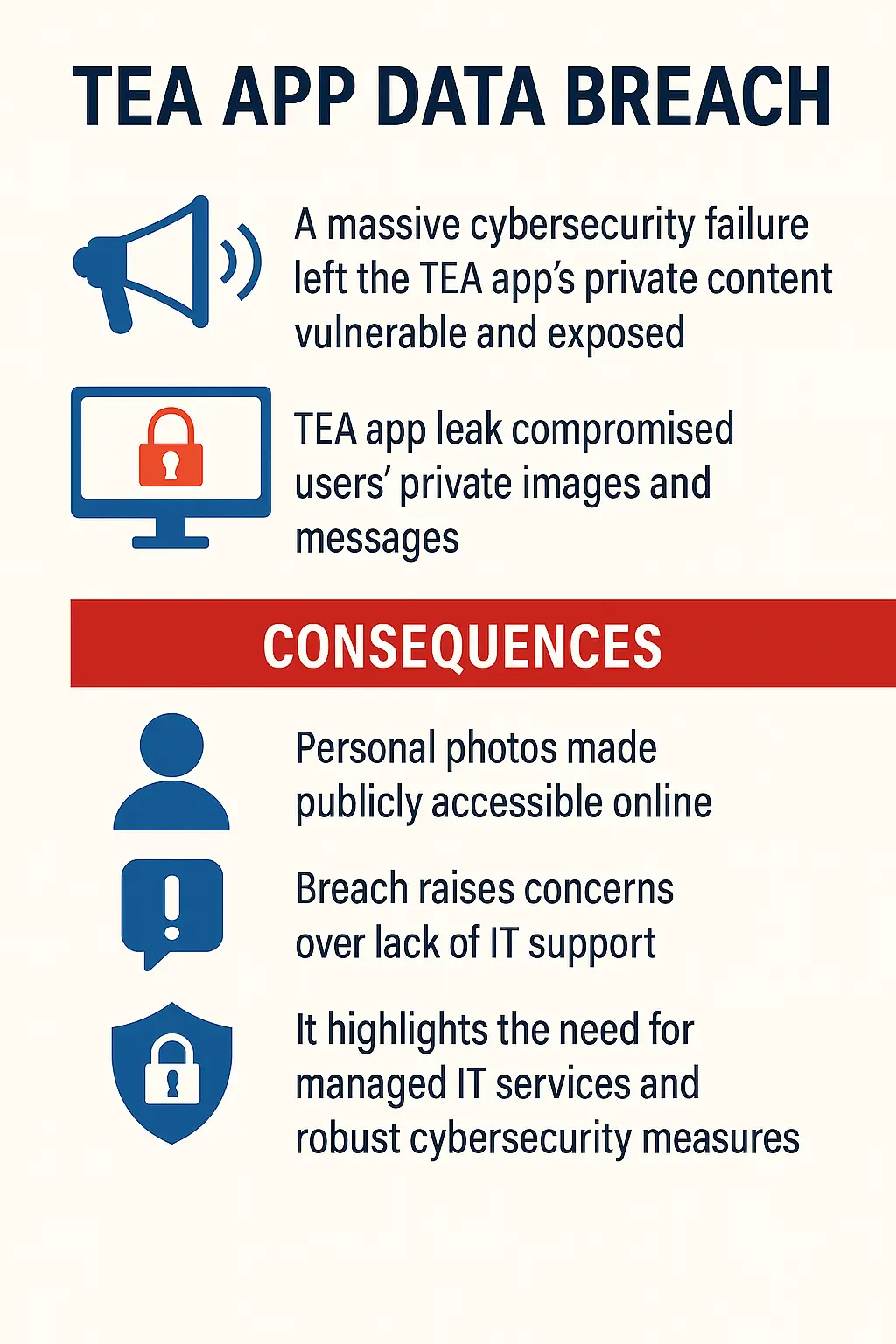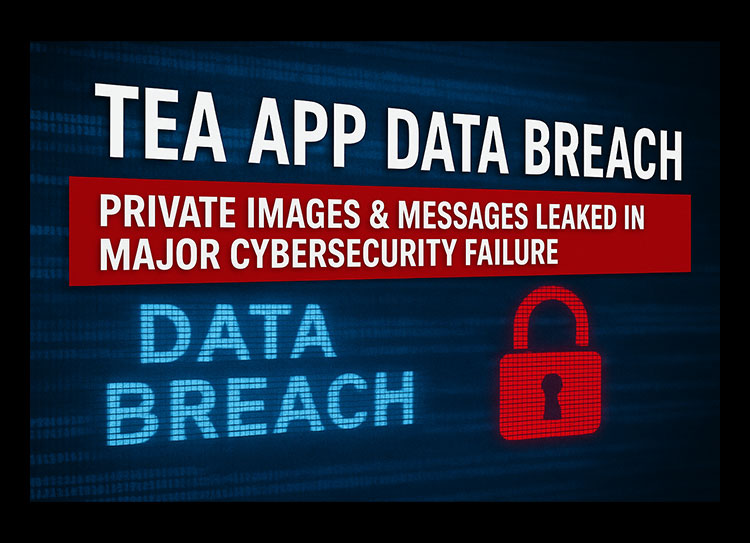What happens when an app billed as a safe haven becomes the most dangerous place to share secrets?
Tea App Data Breach Exposes Private Content and Imagery
It was meant to be a sanctuary: a women-only dating safety app where users could anonymously review experiences with men, upload ID‑verified selfies, and chat about deeply personal topics. But on July 25, 2025, the Tea app’s systems failed spectacularly. In an instant, approximately 72,000 images—including 13,000 selfies and government‑issued ID scans, plus 59,000 images from posts and comments—were publicly exposed from an unsecured legacy storage system.
That was only the beginning.
A few days later, cybersecurity researcher Kasra Rahjerdi discovered a second unsecured database containing over 1.1 million private direct messages, many of which included intimate details concerning divorce, abortion, cheating, location sharing, and personal contact data.
What Was Leaked and Who Was Affected?
Legacy Image Store
- Tea admitted that images stored before February 24, 2024 were in an outdated archive server.
- The breach affected users who signed up before February 2024, as Tea later discontinued the ID requirement.
- While no email addresses or phone numbers were exposed, many verification and user-submitted images remain online.
Private Messages
- The second compromise revealed 1.1 million DMs, spanning February 2023 through July 2025.
- Private conversations included phone numbers, meeting locations, and deeply personal content (e.g. assault, infidelity, abortion).
Scale of Exposure
- Tea had grown to 1.6–1.7 million users, with up to 4 million at its peak after going viral.
- Image data and message content surfaced on 4chan and X, amplifying the breach and creating doxxing risks.

Company Response & Investigation
- Tea immediately disabled direct messaging features and took the affected systems offline “out of an abundance of caution”.
- The company engaged external cybersecurity experts and reportedly alerted the FBI, which is now investigating.
- Tea said the legacy images were retained for legal and compliance reasons despite promises to delete them post verification, citing cyber‑bullying investigation protocols.
Legal and Ethical Fallout
Two class‑action lawsuits were filed in the Northern District of California, alleging negligence, breach of contract, and failure to protect users’ privacy:
- Griselda Reyes v. Tea seeks monetary damages plus court orders to encrypt or purge existing sensitive data.
- An anonymous plaintiff claims the app broke its promise of anonymity and safety, particularly when community watchdogs used Tea to report potential abusers.
Critics and journalists argue Tea’s model of anonymous male flagging and AI-based verification promoted digital vigilantism and vulnerable behavior profiling—even before the hack turned it into a privacy nightmare.
Technical Breakdown: How Did It Happen?
Poor Data Migration & Legacy Infrastructure
- Tea’s early systems stored data in unsecured Firebase buckets and unprotected APIs.
- During migration to new architecture, legacy archives were not fully transitioned or secured, leaving them exposed.
Weak Security Practices
- Unencrypted databases and insufficient access controls opened doors for unauthorized retrieval.
- Experts cite rapid “vibe coding”—development accelerated by AI tools without robust security testing—as a growing risk in new apps.
Public Platforms Amplified Exposure
- Once leaked on forums like 4chan, the data spread rapidly.
- Tea’s viral growth and feminist-friendly branding made it a target for online harassment and backlash.
Human Stories: The Costs of Exposure
Users who trusted Tea with their most sensitive experiences—survivors of assault, whistleblowers, those sharing about harassment or reproductive decisions—are now at heightened risk. Conversations shared in confidence have become evidence for doxxing, blackmail, or harassment. Some describe the experience becoming a privacy betrayal from a platform meant to empower them.
Lessons for Cybersecurity, IT Support & Managed IT Services
- Secure Legacy Data
- Never assume old archives are safe. Legacy systems must be encrypted or securely deprecated.
- Enforce Zero‑Trust Access Controls
- All APIs, message stores, and admin systems require strict role-based authentication and constant auditing.
- Engage Cybersecurity Services Early
- Penetration testing and code audits should accompany rapid development and AI-driven feature rollouts.
- Data Retention & Deletion Policies
- Explicit retention policies, especially for sensitive images or ID scans, are critical from day one.
- Crisis Preparedness & Communication
- IT support teams must have incident response plans and legal coordination for privacy breaches.
Recovery Path Forward
Tea has pledged to provide identity protection services to affected users, tighten its infrastructure, and rebuild trust with external audits and compliance documentation.
Cybersecurity experts recommend all users affected to:
- Monitor financial and social media accounts.
- Watch for phishing, impersonation attempts, or collateral damage via third-party tracing.
- Demand transparency, enforcement of data deletion, and legal safeguards.
Final Thoughts
This debacle underscores a chilling reality: an app built for community safety can become a dangerous Pandora’s box when cybersecurity fails. Tea app leak is now a cautionary tale—not just about broken trust, but about how sensitive data, once entrusted, demands the highest security measures at every stage. For businesses and users alike, it reinforces that technical vigilance must match the earnest intent behind any digital platform.

